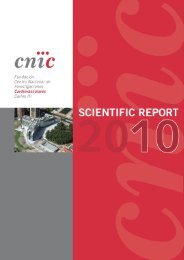Appendix - CNIC
Appendix - CNIC
Appendix - CNIC
You also want an ePaper? Increase the reach of your titles
YUMPU automatically turns print PDFs into web optimized ePapers that Google loves.
SCIENTIFIC REPORT ´09<br />
Angiogenesis, the formation of new capillaries, is closely<br />
linked to inflammation. We are interested in the molecular and<br />
cellular processes that initiate angiogenesis and control the<br />
decision between stabilization or regression of new<br />
vasculature, and how these are linked to the inflammatory<br />
infiltrate. Our work focuses on proteases and related<br />
molecules involved in matrix remodeling, and has<br />
characterized the contribution of membrane-type matrix<br />
metalloproteinase 1 (MT1-MMP) to chemokine and nitric<br />
oxide-induced angiogenesis and monocyte migration. We are<br />
also interested in MT4-MMP, a GPI-anchored MMP of<br />
unknown function.<br />
We have recently identified a novel, catalysis-independent<br />
function for MT1-MMP in macrophage fusion during<br />
osteoclast and giant cell formation. The mechanism involves<br />
binding of the MT1-MMP cytosolic tail to the adaptor<br />
p130Cas, resulting in increased Rac1 membrane targeting<br />
and activity. This finding suggests that MT1-MMP regulation<br />
and functions are cell-context dependent, and we are currently<br />
testing this hypothesis in endothelial cells in the context of<br />
angiogenesis.<br />
3 Vascular Biology and Inflammation<br />
Matrix metalloproteinases<br />
in angiogenesis and inflammation<br />
> RESEARCH INTEREST<br />
Head of Laboratory: Alicia G. Arroyo<br />
Postdoctoral Researchers: Pilar Gonzalo<br />
Rubén A. Mota<br />
Fernando Neria<br />
Predoctoral Researchers: María Victoria Hernández de Riquer<br />
Agnieszka Koziol<br />
Mara Martín<br />
Vanessa Moreno<br />
43<br />
Technician: Ángela Pollán<br />
We are also conducting proteomic studies to identify the<br />
collection of cellular substrates (degradome) processed by<br />
MT1-MMP and MT4-MMP in endothelial cells and leukocytes,<br />
and further efforts are directed at defining the molecular<br />
networks in which these proteases participate in these cells.<br />
We are exploring the functional impact of MT1-MMP and<br />
MT4-MMP through studies in cell-based systems and<br />
genetically-modified mouse models of angiogenesis, leukocyte<br />
recruitment and inflammatory disorders such as<br />
atherosclerosis. We are also interested in characterizing new<br />
molecules of potential relevance to vascular integrity and<br />
angiogenesis, such as extracellular matrix metalloproteinase<br />
inducer (EMMPRIN).<br />
Through these projects, we aim to extend our knowledge of<br />
where, when and how MT-MMPs and their regulators modulate<br />
endothelial and leukocyte behavior during the establishment<br />
and progression of chronic inflammatory disorders.<br />
SILAC (stable isotype labeling of aminoacids in culture) is a quantitative proteomic approach that we are using to identify the degradome of specific<br />
proteases in cell types involved in inflammation and angiogenesis. The figure shows a mass spectrum obtained from an actin peptide labeled with<br />
heavy or light amino acids.



